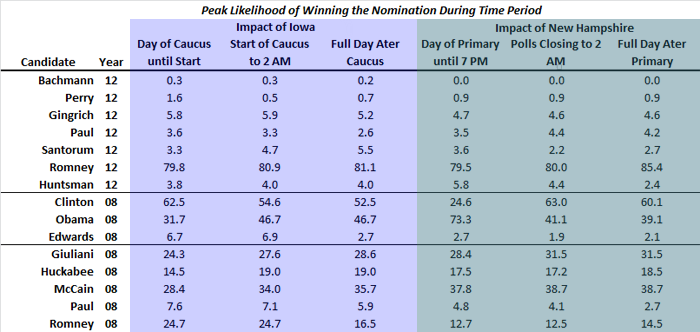For Romney, Iowa and New Hampshire Were Meaningless
Mitt Romney went into Iowa as the heavy favorite to win the Republican nomination and he leaves New Hampshire in the same position. Unlike the see-saw like swings in the Democratic nomination battle of 2008 or the steady movement in the Republican nomination battle of 2008, all of the candidates' positions remained relatively static during the entire period surrounding these first two primary contests.
Considering the following chart, which shows the market-based odds over the course of the Iowa and New Hampshire contests for both this and last cycle:
Hat Tip: Eric Zitzewitz, Associate Professor of Economics at Dartmouth, for working with me on the idea for the post and the table. Sources: Betfair and Intrade
In the 2008 Democratic primary contests, Barack Obama's likelihood of gaining the nomination rose with his victory in Iowa and sunk with his loss in New Hampshire, eventually settling a little higher than he started. Obama peaked between the two contests, as expectations rose that he would carry New Hampshire and sweep to victory. Conversely, Hillary Clinton's likelihood of gaining the nomination went down and then recovered, eventually settling just below where she started. The main overall shift was that Obama captured most of John Edwards' likelihood of victory as he crashed with his Iowa finish.
In the 2008 Republican primary contests, McCain moved steadily upward, as did Giuliani. Both candidates stayed out of Iowa and were perceived to have benefited from the victory for Mike Huckabee, who wasn't considered as nationally viable. Huckabee himself held rather steady, as the markets perceived that he was still unlikely to pull off the nomination, despite his strong showing in Iowa. The 2008 versions of Mitt Romney and Ron Paul both crashed in response to disappointing positions in Iowa.
If you look at the big picture, Iowa and New Hampshire still had a big impact on the race in 2012. Tens of millions of dollars and tens of thousands of man-hours were spent campaigning there. The polls and images of candidates that came from there shaped the race to where it was at the start of the year. It is just that the actual election became a meaningless afterthought.
Follow along on PredictWise for the real-time likelihood of the upcoming republican primaries, the Republican nomination, and the presidential election.
David Rothschild is an economist at Yahoo! Research. He has a Ph.D. in applied economics from the Wharton School of Business at the University of Pennsylvania. His dissertation is in creating aggregated forecasts from individual-level information. Follow him on Twitter @DavMicRot and email him at thesignal@yahoo-inc.com.
Want more? Visit The Signal blog or connect with us on Facebook and follow us on Twitter.



